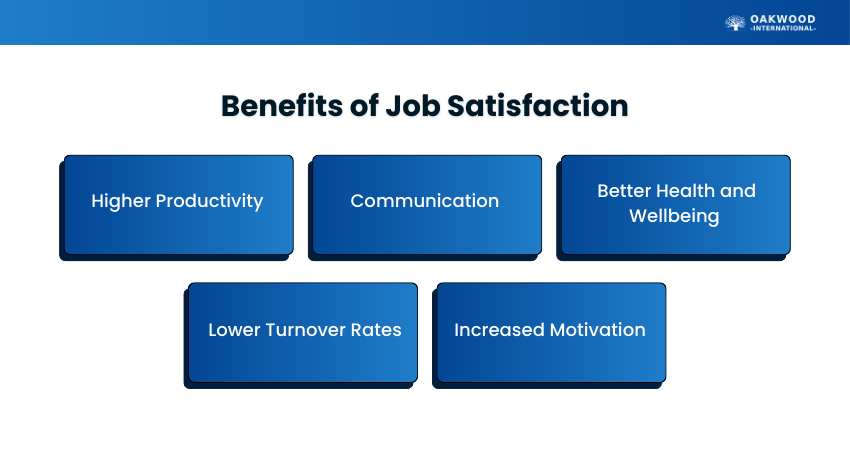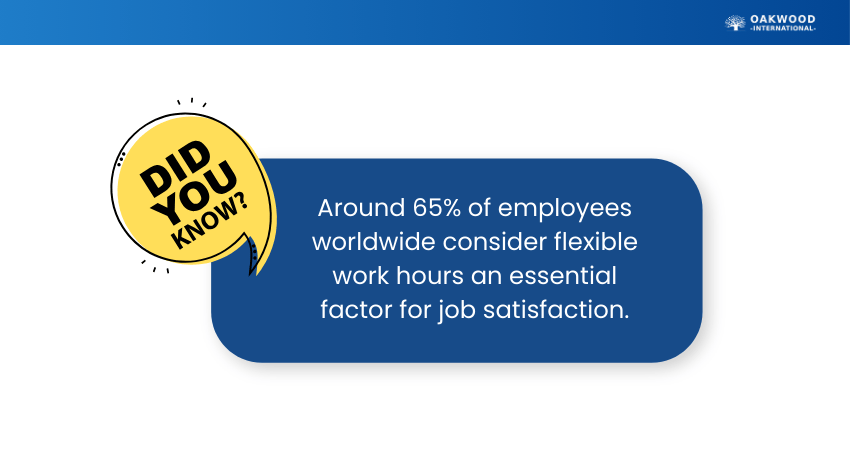Table of Contents


Being happy at a job is more than just an ambition. It's a necessity. After all, employees spend a large part of their daily lives earning a livelihood. So, Job Satisfaction is about finding purpose and happiness in the work they do every day. In the fast-paced professional world, understanding what drives satisfaction can transform careers as well as entire organisations.
This blog explores what Job Satisfaction is, why it matters more than ever, and how both employers and employees can cultivate a workplace where engagement thrives. So read on and ensure the space between your employees’ clock-in and clock-out times is filled with fulfilment!
Table of Contents
1) What is Job Satisfaction?
2) What Causes Job Satisfaction?
3) Benefits of Job Satisfaction
4) How to Increase Job Satisfaction?
5) Conclusion
What is Job Satisfaction?
Job Satisfaction is the sense of happiness and fulfilment an employee experiences in their role. It depends on factors such as the type of work, work-life balance, growth opportunities, and workplace relationships. It also depends on whether the job aligns with personal values. When employees feel valued and fairly rewarded, they are more motivated and healthier overall.
On the other hand, low job satisfaction can lead to stress, disengagement, and increased staff turnover. Companies that prioritise employee satisfaction often focus on creating supportive environments, encouraging open communication, offering recognition, and providing opportunities for career development. Ultimately, Job Satisfaction is essential for both employee well-being and organisational success.
What Causes Job Satisfaction?
The reasons for Job Satisfaction can vary from person to person. However, several common factors consistently contribute to it, including the following:
1) Opportunities
Opportunities for growth, learning and promotion help employees stay engaged. Having career progression options encourages long-term commitment to the company. Employees are more likely to stay when they see a clear career path ahead.
2) Job Security
Stability plays a key role in Job Satisfaction. Employees who are not constantly worried about losing their jobs can focus more on improving their performance and developing their skills. A sense of job security reduces stress and fosters a more positive work environment.
3) Management
Good relationships with supervisors and open communication play a big role. Supportive management reduces turnover and increases employee trust. When leaders listen and act fairly, employees feel respected and motivated.
4) Culture
A safe, inclusive, and positive workplace culture significantly enhances Job Satisfaction. Companies that value diversity and respect allow employees to thrive and grow. A healthy culture creates belonging, which strengthens engagement and overall performance.
5) Engagement
Employees feel satisfied when they are actively involved in their work and see the impact of their efforts. Engaged workers are usually more focused, productive, and motivated. This sense of purpose makes them more committed to the company.
6) Compensation
Fair pay and benefits make employees feel valued. Beyond salary, perks like extra holidays, health benefits, or childcare support can also boost satisfaction. When employees feel fairly rewarded, loyalty towards the company increases.
7) Appreciation
Recognition of effort and skills increases Job Satisfaction. A simple thank you or acknowledgment in meetings can make employees feel connected and valued. Consistent appreciation also builds morale and strengthens team spirit.
Sign up for our HR Leadership Courses and craft future-ready HR strategies that fuel innovation - Register now!
Benefits of Job Satisfaction
From boosted motivation to higher productivity, there are numerous benefits of Job Satisfaction. Let’s explore them:

1) Higher Productivity
1) Happy employees have better focus and problem-solving skills.
2) Satisfied employees are typically more productive, contributing to better overall performance.
3) Employers can measure satisfaction using surveys, questionnaires, exit interviews, and regular feedback.
4) Companies such as Google invest in employee happiness to boost results.
5) Key factors include company culture, fair pay and career development opportunities.
6) You must recognise employee contributions and highlight how their work adds value and purpose.
2) Communication
1) Effective communication makes employees feel valued, included, and safe to share ideas.
2) It builds trust and strengthens teamwork.
3) Poor communication can cause disengagement and frustration.
4) Open dialogue is essential to ensure every perspective is heard. These can reveal valuable insights.
5) Providing communication sessions helps employees express themselves more clearly and fosters stronger workplace relationships.
3) Better Health and Wellbeing
1) Job Satisfaction is closely linked to lower stress levels and improved mental health.
2) Satisfied employees tend to be healthier, more creative, and more collaborative.
3) Positive emotions enhance brain function, aiding problem-solving and teamwork.
4) Workplaces that support well-being see lower absenteeism.
5) You should promote employee health by providing nutritious food options, access to healthcare, exercise opportunities, and mental health support.
4) Lower Turnover Rates
1) Content employees are less likely to quit. This will lower recruitment costs.
2) Reduced turnover helps build a strong and positive workplace culture.
3) Recognition, growth opportunities and purpose often motivate more than pay alone.
4) Employees connected to the company’s mission are more committed and driven.
5) You must share the company’s vision and show employees how their role supports overall goals.
5) Increased Motivation
1) When people enjoy their work, they feel more motivated to perform at their best.
2) They show greater engagement, go the extra mile, and put in extra effort.
3) Satisfied teams improve morale, foster positivity, and create a healthier, more collaborative work environment.
4) Speak with employees individually or in groups to learn what motivates them and resolve challenges.
Turn everyday employees into energised brand ambassadors of organisational excellence. Sign up for our Employee Engagement Training now!
How to Increase Job Satisfaction?
There are many ways to feel more satisfied in your current job without changing companies. Here are some simple steps:
1) Understand Your Role
Take time to reflect on your job, what you’ve achieved, and how your work supports others. Looking back at your accomplishments can give you pride and a renewed sense of purpose.
2) Help Others
Supporting coworkers or clients makes work more meaningful and rewarding. Consider mentoring, offering assistance with tasks, or strengthening client relationships. Helping others improves both Job Satisfaction and workplace connections.
3)Switch Job Tasks
Taking on new responsibilities or training can refresh your outlook and expand your skills. Speak with your Manager about trying unfamiliar tasks that inspire and challenge you.

4) Work with Supportive People
Positive colleagues can lift your mood and make work more enjoyable. Spend time with people you admire, seek advice, or suggest morale-boosting initiatives if the office atmosphere needs improvement.
5) Find Balance
A healthy work-life balance reduces stress and helps prevent burnout. Make time for family, hobbies, and rest. If possible, explore flexible work options like remote working to create more balance.
6) Set Goals
Create personal or professional goals to stay motivated. Learning new skills or aiming for career advancement can give you motivation and something to look forward to.
7) Focus on the Positives
During challenges, try to identify the potential benefits, such as learning opportunities or personal growth. Practising gratitude for the positive aspects of your job can also improve satisfaction and overall outlook.
Conclusion
Understanding What is Job Satisfaction is vital because it's the heartbeat of a healthy workplace. It shapes motivation, creativity and overall success for employees as well as the employers. When employees feel valued and fulfilled, they thrive and so do the businesses. After all, a satisfied workforce isn’t just productive, it’s unstoppable.
Navigate the human side of business with confidence through our Employee Relations Training - Register now!


 Back
Back



 Back to Catagories
Back to Catagories





 + 44 7452 122728
+ 44 7452 122728










